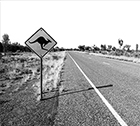What possible connection could there be between the Hells Angels motorcycle club, ex-federal politician Mal Brough and the Northern Territory Intervention?
As The Northern Myth noted last week, NT Deputy Chief Minister Dave Tollner, wearing his Business Minister’s hat, had issued a decree that, pursuant to his powers under section 33AA of the NT’s Liquor Act, at any premises in the NT where liquor is sold for consumption “on premises” no one “wearing the colours, insignia or emblems of any known outlaw motorcycle gang — or bikie gang would be allowed onto that premises”.
One comment from a local lawyer alerted me to the possibility that the use of s33AA of the Liquor Act might have been unlawful — a law primarily to do with the control and sale of alcohol — to prevent a class of people from doing certain things at certain places. This piqued my interest in the legislative history of s33AA.
It was introduced to the NT Legislative Assembly on August 22, 2007 as part of the Liquor Legislation Amendment Bill 2007. In the second reading speech, then-minister for alcohol policy Dr Chris Burns noted:
“… the purpose of this Bill is to introduce urgent reforms to the Liquor Act. Some measures have been contemplated for some time, while others are a result of the release of the inquiry into the protection of Aboriginal children from s-xual abuse.”
That last comment wasn’t entirely accurate. Another reason for the introduction of the “urgent reforms” in the legislation had unfolded two weeks earlier when federal indigenous affair minister Mal Brough introduced, with similar urgency, his Northern Territory Emergency Response Bill 2007. In the second reading of that bill, which provided the legislative teeth for the coup that had caught Clare Martin’s NT Labor government so unawares in late June that year, Brough pledged to “dry up the rivers of grog” flowing through NT Aboriginal communities and that “one of the key measures in this bill provides for widespread alcohol restrictions”.
Two weeks later in the NT Parliament Burns revealed the link between the alcohol restrictions in Brough’s Northern Territory Emergency Response (Intervention) bill:
“The reforms in this bill will dovetail with the amendments being made to the Liquor Act by the Commonwealth government.”
Most bills introduced into the NT Parliament “lie on the table” for 28 days. Not this one.
Just eight days later the Liquor Legislation Amendment Bill was brought back as a matter of urgency. Brough’s NTER amendments to the Liquor Act would come into force on September 15; the urgency focused the attention of politicians when the Liquor Legislation Amendment Bill came back before the NT Parliament on August 30, the last day of sittings for five weeks. Burns opened proceedings on the application to suspend standing orders:
“Following the urgent passage of the Commonwealth bill, it was necessary for the Northern Territory to pass its own legislation to both complement and ensure the workability of the Commonwealth’s new law before its commencement on 15 September … as I have already stated, we are committed to working with the Commonwealth to minimise the harmful impact of alcohol on Aboriginal Territorians.”
Opposition and independent members raised concerns about the urgency of the legislation and whether it was a “knee-jerk reaction” to the Commonwealth. Treasurer and attorney-general Syd Stirling cautioned that his government would be:
“… very careful about the use of urgency in this House … what we are doing, despite our reservations about the urgency and the haste with which the federal government passed their legislation, is our darnedest to keep up with them in complementary legislation.”
The urgency motion passed and later that day the bill came on for debate. The Country Liberal Party opposition expressed concerns about the “extraordinary” powers granted to the minister but indicated it would not oppose its passage.








Crikey encourages robust conversations on our website. However, we’re a small team, so sometimes we have to reluctantly turn comments off due to legal risk. Thanks for your understanding and in the meantime, have a read of our moderation guidelines.